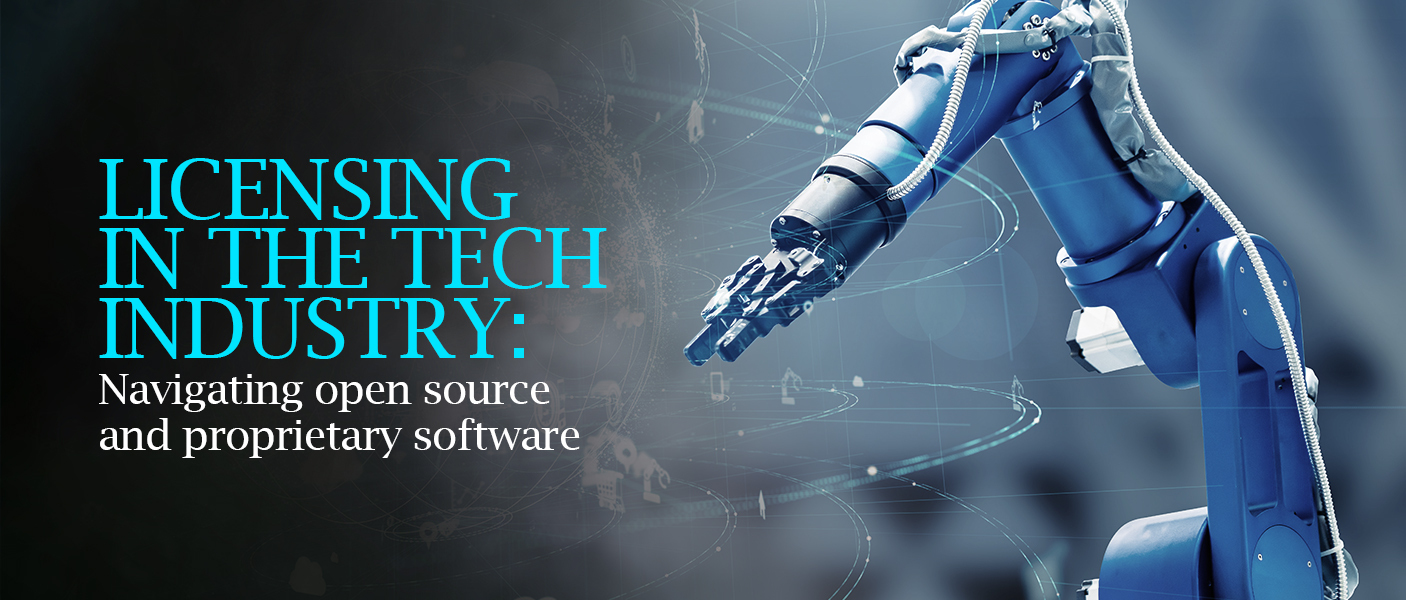Licensing in the Tech Industry: Navigating Open Source and Proprietary Software
January 30, 2024 By Shruti NairIn the ever-evolving landscape of the tech industry, the choices companies make regarding software licensing (Patent and Licensing Law) play a pivotal role in shaping their products, innovation strategies, and overall business models. The dichotomy between open source and proprietary software licensing presents a spectrum of options, each with its unique advantages and considerations.
In this blog, we explore the dynamics of licensing in the tech sector, shedding light on the intricacies of both open source and proprietary software and how businesses can navigate these choices for optimal outcomes.
Understanding Open Source Licensing
Open source software operates on the principles of collaboration, transparency, and community-driven development. Licensing terms for open source software grant users the freedom to access, modify, and distribute the source code. Popular open source licenses include the GNU General Public License (GPL), Apache License, and MIT License. There are over 80 types of open source license, but they usually fall into 1 of the 2 primary categories: copyleft and permissive.
Copyleft License
Copyleft license is a license type in which code derived from the original open source code inherits its license terms.
Permissive License
Permissive license is a license type that provides more freedom for reuse, modification, and distribution.
Advantages of Open Source Licensing
Community Collaboration
Open source fosters a collaborative environment where developers worldwide contribute to the improvement of the software. This collaborative spirit often leads to faster innovation and problem-solving.
Cost-Efficiency
Open source software is generally free to use, reducing upfront costs for businesses. This affordability is especially attractive for startups and organizations with budget constraints.
Flexibility and Customization
Users can modify open source code to suit their specific needs. This flexibility allows for customization and adaptation, aligning the software closely with the organization's requirements.
Rapid Development
With a global community working on the codebase, open source projects often benefit from accelerated development cycles. Bugs are identified and fixed swiftly, contributing to a more robust and reliable software product.
Considerations for Open Source Licensing
License Compliance
Users must comply with the terms of the open source license, ensuring that any modifications or redistributions also adhere to the license terms.
Community Support Dependency
Reliance on community support means that timely assistance may not always be guaranteed. Organizations need to have internal expertise or alternative support options.
Strategic Contributions
Businesses need to carefully consider when and how to contribute back to the open source community. Strategic decisions regarding what to keep proprietary and what to share are crucial.
Proprietary Software Licensing
Proprietary software operates under a closed-source model, where the source code is not freely available to the public. Licensing terms for proprietary software usually involve purchasing a license for a specific duration or version, with restrictions on modification and redistribution.
Advantages of Proprietary Software Licensing
Control and Security
Proprietary software provides a higher level of control over the source code, limiting access to authorized users. This control enhances security, especially for sensitive applications.
Professional Support
Companies offering proprietary software often provide dedicated support services, including troubleshooting, updates, and maintenance. This level of professional support can be crucial for mission-critical applications.
Monetization Opportunities
Proprietary software allows companies to monetize their products directly through licensing fees. This revenue stream supports ongoing development and innovation.
Intellectual Property Protection
Proprietary licenses safeguard a company's intellectual property, preventing unauthorized use, modification, or distribution of the software.
Considerations for Proprietary Software Licensing
Costs
Proprietary software typically involves upfront costs for licensing, which may be a significant factor for small businesses or startups with limited budgets.
Limited Customization
Users have limited ability to modify or customize proprietary software, relying on the vendor to provide updates and enhancements.
Vendor Lock-in
Dependence on a single vendor may lead to vendor lock-in, making it challenging to switch to alternative solutions in the future.
Navigating the Choices
Choosing between open source and proprietary software licensing in the tech industry is not a one-size-fits-all decision. Businesses often find success in a hybrid approach, leveraging the strengths of both models strategically.
Hybrid Models
Some companies release the core of their software as open source while maintaining proprietary modules or add-ons. This allows them to benefit from community contributions while monetizing premium features.
Strategic Planning
Businesses should align their licensing strategy with their overall business objectives. For example, startups may initially leverage open source to minimize costs, while larger enterprises may opt for proprietary solutions for greater control and support.
Legal Counsel
Given the legal complexities surrounding licensing, seeking legal advice is crucial. This ensures that businesses comply with license terms and make informed decisions regarding the use and distribution of software.
In conclusion, the choice between open source and proprietary software licensing is a critical decision that shapes a company's approach to innovation, collaboration, and revenue generation. By understanding the importance of intellectual property rights, its advantages and the considerations of each model, businesses can navigate this complex landscape, fostering technology solutions that align with their goals and values in the ever-evolving tech industry.
To understand the patent and licensing law, you may seek advice from the expert team of Parker and Parker Co. LLP, who are considered as one of the best intellectual property law firms.





